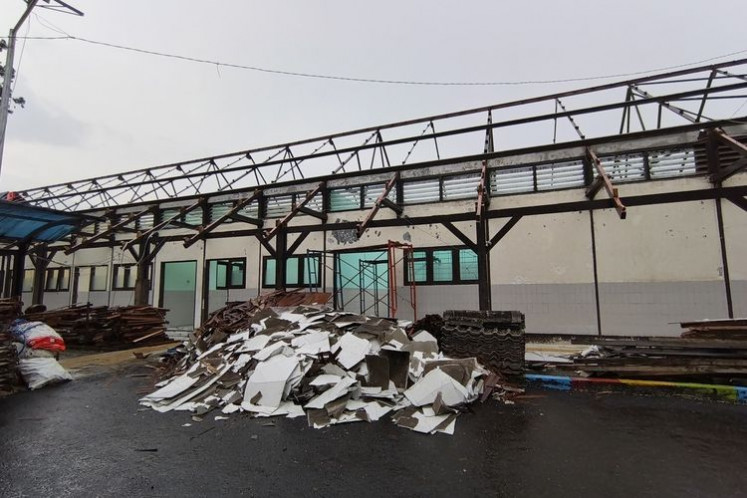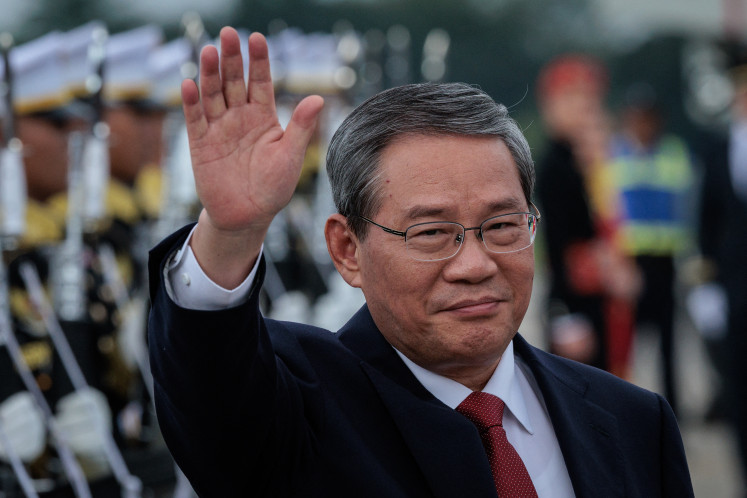PDI-P maintains its hold over Central Java
Watchful eye: A police officer monitors workers preparing ballot boxes at the local branch of the General Elections Commission (KPU) in Temanggung in Central Java on Monday
Change text size
Gift Premium Articles
to Anyone
 Watchful eye: A police officer monitors workers preparing ballot boxes at the local branch of the General Elections Commission (KPU) in Temanggung in Central Java on Monday. (Antara/Anis Efizudin) (KPU) in Temanggung in Central Java on Monday. (Antara/Anis Efizudin)
Watchful eye: A police officer monitors workers preparing ballot boxes at the local branch of the General Elections Commission (KPU) in Temanggung in Central Java on Monday. (Antara/Anis Efizudin) (KPU) in Temanggung in Central Java on Monday. (Antara/Anis Efizudin)
W
span class="caption" style="width: 496px;">Watchful eye: A police officer monitors workers preparing ballot boxes at the local branch of the General Elections Commission (KPU) in Temanggung in Central Java on Monday. (Antara/Anis Efizudin)
Combining loyal voters and the rising popularity of the party's locally born politicians, the Indonesian Democratic Party of Struggle (PDI-P) will likely score another easy win in the province of Central Java in the upcoming legislative election, analysts have predicted.
'Central Java has long been known as the traditional stronghold for nationalist parties, particularly the PDI-P. The party has also taken great advantage of the popularity of [newly elected Central Java Governor] Ganjar Pranowo and [PDI-P presidential candidate] Joko 'Jokowi' Widodo,' Semarang-based Diponegoro University political observer Fitriyah told The Jakarta Post on Friday.
Ganjar, who was born in Karanganyar, was elected the province's governor last year at the age of 45, while Surakarta-born Jokowi served as a mayor in his hometown for seven years before he was elected Jakarta governor in 2012.
Fitriyah also predicted that the Democratic Party (PD), the country's biggest party, would lose a significant amount of public support from the province mainly due to a string of corruption cases that have implicated its politicians in the past few years.
'Even in its strongholds, like Rembang [regency], the PD will likely lose many voters in the upcoming election following the alleged involvement of Regent M. Salim in a graft case,' she added.
At the national level, Democratic Party politicians who have been implicated in corruption cases include former youth and sports minister Andi Mallarangeng, former party chairman Anas Urbaningrum, former treasurer Muhammad Nazaruddin, former Bengkulu governor Agusrin Najamuddin and former lawmaker Angelina Sondakh.
Wachid Hasyim University political analyst Joko Prihatmoko sees the PDI-P's success in maintaining its base of grassroots voters in Central Java as the main reason for the party's domination over other nationalist parties, including the Nasdem Party, the Hanura Party and the Gerindra Party.
'Although the PDI-P has no innovative party member recruitment system and is managed by strong oligarchs who outline the party's policies, its grass roots have remained loyal and solid,' Joko said.
Joko also considers the Golkar Party, which was the country's biggest party during the New Order era, to be the PDI-P's strongest rival in the upcoming legislative election.
'As one of the country's oldest parties, Golkar is well known for its solid organizational structure. However, its recent campaign to bring back New Order romanticism was a blunder for the party as it had no positive impact on today's political campaign,' Joko said.
The PDI-P has won all three legislative elections in Central Java since 1999.
In the 2009 legislative election, the PDI-P finished first in the province after it secured 22.98 percent of votes, followed by the Democratic Party with 15.74 percent, Golkar with 11.54 percent, and the National Mandate Party (PAN) with 6.71 percent.
According to a survey released in April 2013 by the Indonesian Empowerment Research Institute, which Joko coordinated, the PDI-P was predicted to secure 22.1 percent and win the election in Central Java, followed by Golkar with 11.5 percent, the Democratic Party with 10 percent and Gerindra with 4.7 percent.
'These numbers, however, may change on voting day, given the fact that some parties are getting aggressive in the last few days of the open campaign period,' Joko said.
Fitriyah said Gerindra, which has endorsed its chief patron Prabowo Subianto as its presidential candidate, and the newly established Nasdem, could take advantage of being alternative parties for undecided voters.
'We have to admit that voters now have many alternatives. They might support a certain party but end up voting for a lawmaker candidate from another party. The competition among lawmakers is tough. On the other hand, there are many people who would only vote for a certain lawmaker in exchange for financial incentives,' she said.
Despite the aggressive campaigns of some presidential candidates through mass media, particularly television, Joko said voters would still be able to distinguish between legislative and presidential elections, particularly due to their observations of political parties' performance in recent years.
'Although many voters already have a name in mind [of their preferred candidate] for the presidential election, there is no guarantee that they will vote for the [candidate's] party, mainly because of their disappointment about the poor performance of that party,' he said.









